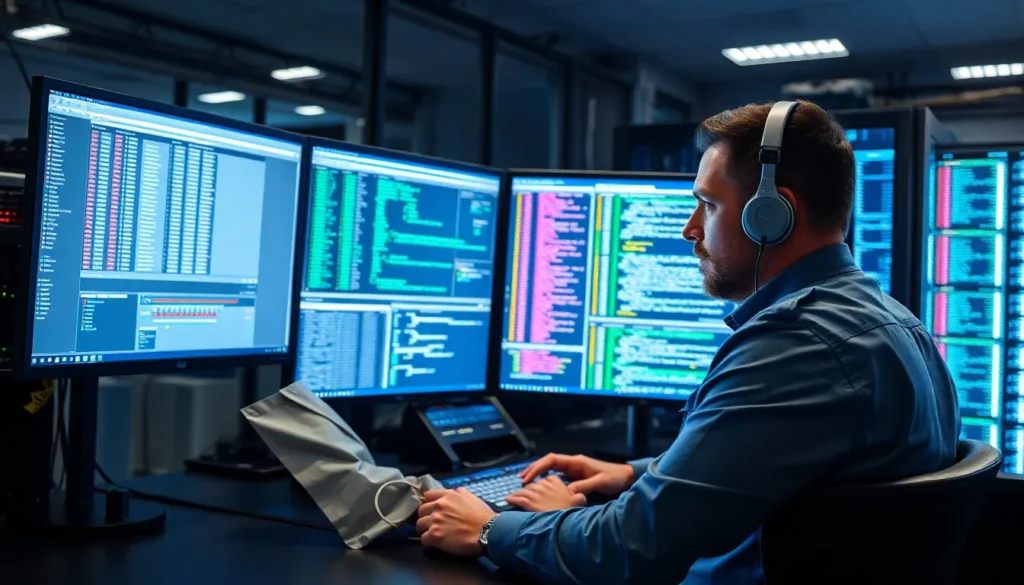Table of Contents
ToggleIn a world where cyber threats lurk around every digital corner, security technicians are the unsung heroes battling the forces of chaos. They’re the ones who ensure that our sensitive data stays safe from prying eyes, all while keeping a cool demeanor and a toolbox full of gadgets. If you think you can handle the pressure and enjoy solving puzzles, a career as a security technician might just be your calling.
Overview of Security Technician Jobs
Security technicians play an essential role in protecting organizations from cyber threats and data breaches. These professionals install, configure, and maintain security systems while ensuring compliance with industry regulations. Responsibilities vary across different sectors, including corporate, healthcare, and governmental organizations.
Individuals in this field typically perform tasks such as conducting security assessments, monitoring network traffic, and responding to security incidents. They utilize various tools and technologies, including firewalls, intrusion detection systems, and encryption software. Skills in troubleshooting, risk assessment, and communication enhance a technician’s effectiveness in the workforce.
Education requirements often include a bachelor’s degree in cybersecurity, information technology, or a related field. Certifications, such as CompTIA Security+, Certified Information Systems Security Professional (CISSP), or Certified Ethical Hacker (CEH), also boost a technician’s credentials. These qualifications not only sharpen technical skills but also demonstrate expertise to potential employers.
The job market for security technicians remains robust, reflecting society’s increasing reliance on technology. According to the Bureau of Labor Statistics, the demand for information security analysts, which includes security technicians, is projected to grow by 31 percent from 2019 to 2029. Competitive salaries, often ranging from $50,000 to $120,000 annually, further attract individuals to this profession.
Overall, security technician jobs offer rewarding opportunities for those interested in technology and problem-solving. The constant evolution of cyber threats requires skilled professionals who can adapt and implement effective security measures.
Key Responsibilities

Security technicians play a vital role in protecting organizations from cyber threats and data breaches. Their responsibilities encompass various tasks, ensuring comprehensive security measures are in place.
Installation of Security Systems
Installation of security systems involves setting up software and hardware components designed to protect sensitive information. Technicians configure firewalls, intrusion detection systems, and access controls to create a secure environment. Following installation, they test systems thoroughly to ensure functionality. Assessing each component’s performance allows for fine-tuning to meet specific organizational needs. Knowledge of current technologies and industry standards facilitates efficient installations that comply with regulations across sectors.
Maintenance and Repair
Maintenance and repair of security systems keep them operational and effective in combating threats. Technicians routinely check for software updates and patches, ensuring systems remain secure against vulnerabilities. Regular audits of existing equipment help identify potential weaknesses or malfunctioning components. Addressing these issues promptly minimizes risks associated with data breaches. Technicians’ skills in troubleshooting enable quick resolution of problems, ensuring uninterrupted security coverage for organizations.
Monitoring and Surveillance
Monitoring and surveillance activities allow security technicians to respond actively to potential threats. They analyze network traffic for unusual patterns that could indicate breaches. Continuous surveillance helps identify suspicious activities in real time, allowing for faster intervention. Utilizing advanced monitoring tools enhances the visibility of security incidents. This proactive approach enables organizations to maintain secure environments and protect sensitive data effectively.
Required Skills and Qualifications
Security technicians require a blend of technical and interpersonal skills, ensuring they effectively protect organizations from cyber threats. Essential qualifications include the right educational background and industry certifications.
Technical Skills
Proficiency in network security principles is vital for security technicians. They must demonstrate expertise with firewalls, intrusion detection systems, and encryption technologies. Familiarity with operating systems and programming languages enhances their ability to configure and troubleshoot security applications. An understanding of vulnerability assessments and penetration testing is also critical. Practical knowledge of security protocols helps them develop robust protection strategies. Continuous learning and staying updated with emerging technologies further strengthen their technical skill set.
Certifications
Certifications validate a security technician’s expertise and commitment to the field. CompTIA Security+ provides foundational knowledge, while Certified Information Systems Security Professional (CISSP) demonstrates advanced skills. Other notable credentials include Certified Ethical Hacker (CEH) and Cisco Certified CyberOps Associate. Employers value these certifications as they signal a technician’s capability to handle security challenges effectively. Pursuing specialized training in areas like cloud security or risk management also enhances employability. Regularly updating certifications reflects a technician’s dedication to professional growth.
Soft Skills
Interpersonal skills play a crucial role in the work of security technicians. Strong communication abilities enable them to articulate complex security concepts to non-technical stakeholders. Problem-solving skills are essential for diagnosing issues and implementing effective solutions promptly. Attention to detail helps in identifying vulnerabilities that may compromise security measures. Adaptability allows technicians to respond to rapidly changing cyber threats. Collaboration skills foster teamwork, essential in coordinating security efforts across different departments. Lastly, a high level of integrity builds trust with clients and colleagues, reinforcing the overall security posture.
Career Path and Advancement
Security technician positions offer promising avenues for both entry-level roles and opportunities for growth in the field.
Entry-Level Positions
Entry-level positions in the security technician landscape often include roles such as security analyst or junior security technician. These roles typically require a bachelor’s degree in cybersecurity or a related field. Newly hired technicians engage in hands-on training, gaining experience in monitoring systems, conducting assessments, and responding to issues. Industry-recognized certifications, like CompTIA Security+ or Security Certified Network Specialist (SCNS), often support advancement from these positions. Individuals in entry-level roles build critical technical skills while collaborating with senior technicians on security protocols and incident responses.
Opportunities for Growth
Advancement opportunities abound for security technicians committed to cultivating their expertise. Many professionals progress to mid-level roles like security engineer or security architect, where they design and implement security solutions. Pursuing further certifications, including Certified Information Systems Security Professional (CISSP) or Certified Ethical Hacker (CEH), enhances qualifications and marketability. Networking within industry groups or attending relevant conferences can facilitate connections and insights about leadership positions. As the demand for security professionals continues to rise, technicians often find themselves moving into managerial roles, overseeing security teams and strategies to protect organizational data effectively.
Job Market and Salary Expectations
The job market for security technicians is expanding rapidly. With a growth projection of 31 percent from 2019 to 2029, opportunities are plentiful across various sectors including corporate, healthcare, and government. Salaries for these roles vary significantly based on experience and location, typically ranging from $50,000 to $120,000 annually.
Career advancement potential also remains strong in this field. Entry-level positions, such as security analyst or junior security technician, require a bachelor’s degree and provide valuable hands-on training. Mid-level roles, like security engineer or security architect, become accessible to those who enhance their credentials with certifications such as CompTIA Security+ or CISSP.
Expect competitive job offers in regions experiencing high demand for cybersecurity talent. Regions prioritizing cybersecurity measures and investments see faster hiring of security technicians, enhancing professional prospects. Salary can further increase for technicians who specialize in emerging technologies or who gain managerial responsibilities overseeing security strategies.
Moreover, the importance of skills cannot be overstated in this sector. Technical skills related to network security principles and intrusion detection systems remain essential for job candidates. Employers also prioritize strong communication, problem-solving, and adaptability, as these skills help technicians address complex security challenges effectively.
Overall, the landscape for security technician jobs showcases rewarding prospects with a focus on both technical expertise and interpersonal abilities. As organizations continue to navigate the evolving threat landscape, well-rounded security professionals will stand out as invaluable assets.
The demand for security technicians continues to grow as organizations recognize the importance of robust cybersecurity measures. With a projected job growth of 31 percent and competitive salaries, this career path offers significant opportunities for those with the right skills and qualifications.
Individuals who possess a blend of technical expertise and strong interpersonal skills will find themselves well-equipped to tackle the challenges of this evolving field. As cyber threats become increasingly sophisticated, security technicians will remain essential in protecting sensitive data and maintaining the integrity of systems across various sectors. Embracing this profession not only leads to a rewarding career but also plays a vital role in safeguarding the digital landscape.




